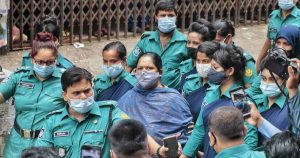Mahfuzur Rahman
A press conference is an ideal event where reporters get the opportunity to assert themselves as journalists in real sense. The duty of a good reporter is to gather information to file a good report from any event he or she attends. There is nothing to promote or belittle anyone in the whole exercise – from asking questions to publishing the reports. Journalists are journalists, and their main duty is to facilitate the communication between individuals and organisations looking for conveying their messages to people. But we, in many cases, cannot do justice to our profession, and it happens for various reasons.Nearly a decade back, I was watching news on a local private TV channel at night when I saw one of my colleagues covering a news conference of a political leader earlier in the day. My colleague was smiling unnecessarily whenever the leader was making points with his eyes on the reporter. There is nothing wrong in smiling if there is anything funny. But an unnecessary smile sends out a message that I agree with you, no matter what you say as smiling is part of communication – gestural communication.
These days, controversies arise over the way journalists cover press conferences. At press conferences, reporters are expected to extract information to file a biting story that readers would like to read. If we want to do so we will have to ask questions — hard questions — to make the individual or individuals to share information needed for an interesting story.
Asking questions at a news conference is an art and it requires some preparations to demonstrate that quality. There is no denying that one should ask a question in a very solid form so that the message he or she wants to throw is clear in every way. If one has the art of eloquence that is fabulous. But journalists in no way should try to undermine anyone with his or personal eloquence. And there should not be any effort to give an impression at the event that he or she has a personal relation with individual who has organised the press conference, let alone flattering. For journalists, it is not a difficult job to establish personal relations with people at the top but that relations must not be misused, and there is no need to drum it up at a press conference.
According to the basic rules of journalism, journalists should not side with any party by appreciating one and denouncing another because it hampers the objective approach of reporting. Readers and viewers expect reporters to present them the untwisted information. Though no one can be neutral not even journalists, but their reporting could be objective.
We need to keep in mind that those, particularly political leaders who efficiently handle journalists, have a tendency to outsmart questioners and they surely enjoy doing so. Journalists, therefore, have to think about such individuals before attending the event. My suggestion is in no away to open books and read overnight as part of preparations to attend a press conference. The fact is that journalists are the enlightened section of society. They have the basic ideas of everything, though not extensively. That is why journalists are called ‘jack of all trades master of none’. This is not only about journalists but also true about those who are in other professions. These days many people are aware of things happening around. They know who is what, and who is doing what and why. Social media give us that impression every day.
A press conference is all about interactions. An effective interaction will happen when there will be prudent questions. Those who arrange a news conference have a whole lot of preparations. They want to convey their own messages in their own way since they want their own promotion. Their main target is to promote their own projects and achievements, and also hide their failures as long as possible. To ask effective questions, one needs to do some home works if the topic of the press conference is a serious one, or else, one will end up asking irrelevant questions.
In many media events, prepared press materials are provided to journalists. On return from their news conferences, our colleagues often share with me that they hardly find anything newsworthy in written materials. In most cases, they say, important information come out during their question-answer session. So asking hard questions is very important. Journalists also need to be careful about the fact that smart speakers try to parry questions about their negative sides. So it is necessary to be tactful and prudent in asking questions so that the speakers cannot avoid difficult queries.
More importantly, we need to be good listeners at any press event, or else, we may miss a point that could be the better storyline. There is also a possibility of misquoting anyone if we fail to be good listeners. Unintentional misquoting is forgivable, but the intentional one dangerous. These days, cellphone recorders are regularly used in covering any event. We need to make the best use of it lest we misquote anyone.
Another problem in journalism is ‘pack reporting’. Pack reporting is what one does without attending any programme. He or she collects the information from others who were present at the event. This is an old problem. But now it has taken a turn for the worse thanks to the online media boom. Filing stories attending any programme is essential for various reasons – it will help you depict the mood and sentiment of its speakers or the organisers as they demonstrated. Ultimately, it will help you file better comprehensive stories than others who did not attend it.
How a journalist behaves at a programme is also important, important for all, including the community. One should not be offensive in his or her body language nor in asking questions. The questions could be challenging ones, but the choice of words should be good and polite, if not excellent. Sometimes we lose tamper when we see any lapses on the part of the organisers, creating tension. It is not necessary for journalists to get VIP treatment. We need to perform our professional duty properly maintaining objectivity.
Cub reporters want to how many stories could be filed from one press conference. The answer is: The stories could be many as per issues dealt with at the event. But one comprehensive story must be filed on the main topic of the press conference for which it is actually arranged. That is why note taking should be perfect and extensive.
Covering a press conference is important, but maintaining professionalism with objective reporting is extremely important. To do that, we need to prepare ourselves both mentally and professionally because people are watching us! – UNB




